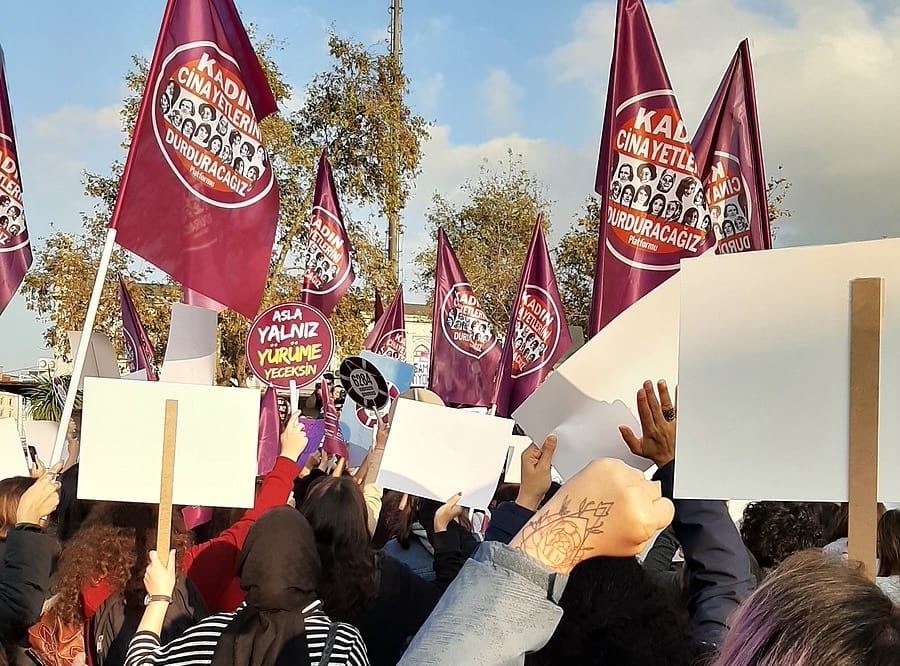In October, Türkiye was rocked by a series of high-profile femicides, culminating in mobilizations for the endemic issue of violence against women. The femicide epidemic is the gruesome product of systems of cultural and political complicity in reproducing and upholding patriarchal structures.
This past October, Türkiye was rocked by a series of high-profile femicides, culminating in mobilizations for and media attention to the endemic issue of violence against women in the country. Over in Shanghai, my VPN-accessed social media was flooded with reposts and paragraphs expressing grief, hatred, and in some instances, despair. The brutal murders of İkbal Uzuner (19) and Ayşenur Halil (19), within the same half-hour by Semih Çelik (19), who publicly committed suicide afterwards, is the current spark that jettisoned these conversations into the mainstream. Çelik was their classmate, and was admitted into a psychiatric hospital multiple times. He had also stalked Uzuner for years prior to the murder. Her murder was especially gruesome – beheaded, her body was left hanging over the historic Theodosian city walls of Istanbul’s Fatih district.
Mainstream media outlets, especially state-controlled ones, framed the murders not as constitutive iterations of a larger social phenomena, but instead through the language of pathology. Similar to how American media portrays White perpetrators of mass shootings, mainstream Turkish media channels focus on the perpetrators’ mental illness, drug use, or upbringing to rationalize away the murders. However, this understanding is limited, ahistoric, and uncontextualized. Instead, the femicide epidemic is the visible manifestation and gruesome product of systems of cultural and political complicity in reproducing and upholding patriarchal structures. In this piece, I attempt to explain this epidemic and the current state of the struggle against femicide. Additionally, I attempt to plug up some holes I see in the discursive framework of certain analysts.
Femicide in Türkiye: An Overview
The femicide numbers in Türkiye, and each individual story these numbers attest to, are staggering. Up until October 11th, over 300 girls and women in Turkiye were victims of femicide this year. In October alone, Kadın Cinayetlerini Durduracağız Platformu (We Will Stop Femicide Platform), a Turkish advocacy group, reported 48 femicides, and 23 suspicious female deaths. Zeroing in on recent months, in August, the country was kept in suspense for weeks following the story of a missing schoolgirl in southeastern Anatolia, until her lifeless body was found by a river. Following this, a young policewoman was killed on duty in September, and in early October, the horrifying double murder made news in the nation’s largest city.
These numbers beg the question: what are the causes of this enduring phenomenon? Some commentators point towards the ingrained nature of patriarchal norms in Turkish culture and religion. While, yes, sexism is rampant in Turkish culture (much like in the rest of the world), it cannot be made the sole explainer of the epidemic. I also look upon culturalist explanations disfavorably, choosing instead to incorporate cultural explanations into a perspective that does not make it central, yet does not discard its validity among greater political, social, and economic structures.
Dynamics of Violence: Causes of Femicide in Türkiye
Şebnem Gümüşçü, Associate Professor of Political Science at Middlebury College, identifies three causes that resonate with my thinking. The first is ineffective legislation, followed by Islamization (ugly term) as the AKP (Justice and Development Party, the ruling party) solution, and weakened institutions and protections.
The first issue identified is ineffective legislation. Currently, Türkiye does possess legislation to prevent violence against women and protect women, children, and other family members from violence (Article 6284). Yet, activists claim that the government has been unwilling to reinforce this, with perpetrators getting off on lenient sentences, and authorities delaying and being overall reluctant to pursue and investigate femicides. This atmosphere has mainly been created by the ruling AKP party, which has been unwilling to listen to the public’s complaints, choosing instead to reaffirm cultural conservatism to placate the wants of key voting blocs that their electoral success necessitates. One prominent example of this is the handling of the Istanbul Convention, a 2012 international agreement within the frame of the European Council to prevent violence against women. However, on March 20th 2021, the Convention was denounced by the authorities, and in July of the same year, Türkiye became the only country to have withdrawn from the convention, despite the fierce opposition of women’s rights defenders and opposition parties.

Gümüşçü then identifies the role of growing Islamization in Türkiye as yet another factor in the epidemic of femicides and violence against women in the country. She specifically blames the proliferation of conservative values, such as the rejection of gender equality and victim blaming. This proliferation is achieved both by discursive practices of the party in power, as well as by empowering the Directorate of Religious Affairs and changing the educational curriculum. However, explanations that centre the Islamist nature of the AKP as a driving cause of anti-women thinking and action in the country label the theological practice of Islam as somehow being innately anti-woman, instead of viewing patriarchal elements within the interpretation of Islam as an issue. This frankly ignores international realities, such as the success of the Islamic Feminist movement in Iran, which has worked within the framework of the Islamist government to fight for gender equality.
Lastly, and in my opinion, most importantly, the 20+ years of AKP rule, marked by austerity and the mainstreaming of neoliberalism, has greatly weakened institutions that secured protections. This is most obvious in the relaxation of state oversight of the incarceration system and cybersecurity. In 2020, special amnesty was extended to over 100,000 convicted felons. In 2023, all felons (except for political ones) convicted of murder, assault, sexual offences, and other charges, had their sentences substantially reduced and parole rights expanded. Gümüşçü believes that this has incentivized criminal activity, instead of deterring it. Additionally, during the pandemic, hackers were able to steal the personal information of millions of Turkish citizens. It was reported that hackers were able to sell the information to people who then blackmailed and sexually harassed girls.
The State of the Fight
Currently, the fight against femicide and violence against women in Türkiye by women’s organizations, opposition parties, and everyday women continues. During the month of October, there were mobilizations such as marches in the culturally progressive quarters of Kadıköy in İstanbul. Organizations such as We Will Stop Femicides Platform and others have been around since the early 2010s and have been fighting for the implementation of stronger laws pertaining to violence against women and femicide. Opposition parties have also played an important role in arguing for expanded legal protections, with a notable figure being Sera Kadıgil, a leading member of the Workers Party of Türkey. The struggle does seem to be working, with President Recep Tayyip Erdoğan pledging to harden the country’s criminal law. However, many are not confident this promise will hold.

For now, it seems that the place most likely for change to come from is civil society, and this is not the case in only Türkiye either. Femicide and violence against women is an issue throughout Asia. The fight against femicide is taking a global presence with women from all faiths, backgrounds, and nationalities. Within the Asian continent, we can also find the fight against femicide growing in India, as ‘Reclaim the Night’ marches were organized in Kolkata following the rape and murder of a doctor in September. The fight against femicide and violence against women has a global front, and it is important to remember that these struggles are never isolated, and are often intricately linked to the thinking and practices across the world.
Derin Bohçacı
Disclaimer: The views expressed in this article do not necessarily represent those of The PublicAsian.




Comments ()